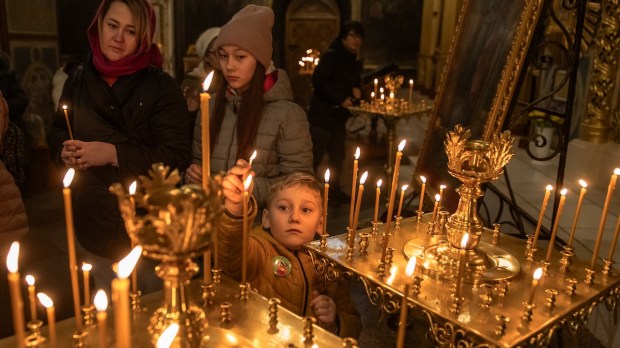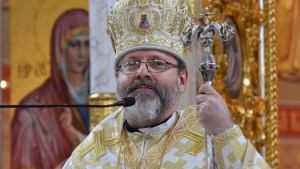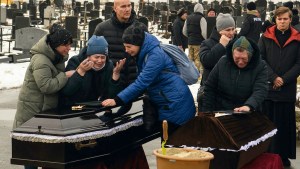At the end of January, a prominent European political leader expressed his doubt that the Ukrainian capital was beset by war.
“There’s no war in Kyiv,” said Slovak Prime Minister Robert Fico. According to him, life in the city was “absolutely normal.”
When a reporter asked Catholic leaders in a recent press conference sponsored by Aid to the Church in Need what they made of Fico’s attitude, one responded, “Come and see.”
“The capital of Ukraine is target number one for massive shelling attacks with missiles and rockets,” said His Beatitude Sviatoslav Shevchuk, head and father of the Ukrainian Greek Catholic Church.
Though Ukraine’s armed forces repelled Russia from Kyiv and its environs early in the now-two-year-old invasion, Moscow still launches missiles and drones against the capital on a regular basis. Most are repelled by air defense systems, but some still do damage – and take lives.
Archbishop Visvaldas Kulbokas, who as papal nuncio to Ukraine lives in Kyiv, pointed out that the residence and cathedral of the Major Archbishop of the Ukrainian Catholic Church – His Beatitude Sviatoslav – suffered damage from recent air attacks, though no one was hurt.
“I saw them with my eyes and in videos,” Archbishop Kulbokas said. “And it happens very frequently that during Holy Mass we hear missiles or drones passing over.”
“If we hear them,” he added, “it’s already a good sign because when a drone or especially a missile arrives at one’s house, … it’s too late to hear it.”
Ukraine is still struggling to defend its territorial integrity and independence, two years after Russian President Vladimir Putin launched a “special military operation” on February 24, 2022. Russia occupies nearly one-fifth of the nation’s territory, including Crimea, which Moscow annexed in 2014, and part of the eastern Donbas region. But Ukraine has recovered half of the territory Russian forces took over in 2022.
In interviews with Aleteia and in settings such as the Aid to the Church in Need conference, which was hosted on February 14, Ukrainian Catholics and others discussed the current state of affairs, how they are coping, and how they feel about the future of the war and a possible victory or peace agreement.
A wounded people
Much of the talk centered on how wounded Ukraine is as a nation, and what humanitarian efforts are being undertaken.
Archbishop Kulbokas, who was born in the Lithuanian Soviet Socialist Republic, said he personally knows families who live close to the nunciature in Kyiv who have lost members, not during missile and drone attacks, but afterwards – because of the impact on their health.
“Sometimes their houses are damaged and then for six or seven weeks they are traumatized and some of them die because of heart attacks, five or six days later,” he said. “All the doctors are stressing that the rates of cancer and immune disorders and heart disease have increased very, very high.”
In a separate interview, the president of Caritas Ukraine, Tetiana Stawnychy, said that there’s an “intensity to the missile and drone attacks that happen throughout the country, not just along the front line. There’s an intensity to the humanitarian crisis. It’s just that it’s become more complicated.”
Stawnychy said that Caritas served 3 million people in the first year of the invasion, when it was focused on the massive wave of migration – refugees heading into other European countries and internally displaced persons looking for a more peaceful part of Ukraine. The organization now is helping a lot of people deal with trauma, even while many people are still in need of basic food, shelter, hygiene, and work or education.
“The United Nations is estimating 14.6 million people in need of humanitarian aid,” she said. “That’s 40% of the population.”
“I have many colleagues and friends who have lost their relatives in this war,” said Yuriy Pidlisnyy, chairman of the Political Science Department at the Ukrainian Catholic University in Lviv. “If someone is missing, people have no information where the person is because they have no more connection with the person who disappears on the front line. Some are in captivity as war prisoners. I have a lot of friends and colleagues who were affected in this way and, well, they suffer a lot.”
“Every Ukrainian has somebody – a relative or friend – that has been lost in this war, or one way or another has been affected by the war,” said Yaroslav Hrytsak, a historian who teaches at the Ukrainian Catholic University. “But that said, they tend to hold together.”
Hrytsak, who is involved in a new Ukrainian history project sponsored by the Victor Pinchuk Foundation, said there is a growing consensus that the war will go on for a long time.
“This is war for long, and we have to stay attuned to it psychologically and emotionally,” he told Aleteia.
Archbishop Kulbokas, the papal nuncio, said that a psychologist told him that a person returning from captivity — either a POW or a civilian that had been taken hostage — will claim to be fine: “‘I’m fine. I returned to freedom.’ But when you start working with that person, you discover that that person is unable to paint a picture because he will use only the black color. He’s unable to use all other colors because his life has become a black blot occupying everything,” the archbishop said.
Stawnychy also tried to explain how stress has affected the population.
“It’s hard to be under attack for two years. You know, the air raid sirens go off in the middle of the night; often sleep is interrupted; there’s explosions in the city; you don’t know what’s happening; people reach out to their loved ones. ‘Are you okay?’” Stawnychy told Aleteia. “And this is throughout the whole country.”
She said that in recent months there has been an intensification of attacks.
“After two years, of course, that’s wearing [people] down,” she said. “But there’s still this will to live. … There’s a trauma that happens, and people get up, and then they work on it, they fix it. They repair things. They move forward.”
Families grieving over the loss of loved ones is a “huge need right now,” Stawnychy said. Caritas is responding to that and a number of other issues, including physical and emotional wounds. “We have these crisis centers in most of our [40-plus] locations, where we have a crisis counselor, we have a case manager, we have someone doing psychosocial support,” Stawnychy explained. “So somebody could come to us and we help them work through issues. We also continue our child-friendly spaces, and develop them further, to be offering more, kind of art therapy and other things for the youth.”
“The idea is to help people work through their trauma and develop resilience and coping skills,” she said.
Church suppression
If the faith helps people get through difficulties, Catholics in some areas of Ukraine apparently are having a hard time. In some of the territories occupied by Russia, especially in the Donbas, where Russia-backed separatists began fighting 10 years ago, there are reports of severe restrictions on the Church and difficulties in providing education.
“In [occupied] Eastern and Southern Ukraine, the very possibility [for the Ukrainian Greek Catholic Church] to exist and to be with our people … is getting more and more difficult until the moment that it is not possible anymore,” said His Beatitude Sviatoslav. “Right now there is no Catholic priest on this side of Ukraine.”
Stawnychy said that in southern areas such as occupied Melitopol, Catholic priests were “told to leave. They were basically arrested and taken to the frontline and then told to walk across.”
His Beatitude Sviatoslav added that in Donetsk, which is divided by a front line that has hardly moved in recent months of near stalemate, “when our people are going to the church to pray each Sunday without the priest, a few weeks ago that church was seized and the door of the church was closed for the people. Especially in the occupied territory of Zaporizhzhia, the Russian authorities issued a special decree which prohibited the existence of the Ukrainian Greek Catholic Church. They confiscated the church properties, and those people who used to go to our churches in that part of Ukraine, even without the presence of their priests, as it was also in Donetsk, they are not allowed anymore.”
So people pray in their homes and follow liturgies online, he said.
Asked if it was possible for the Church to survive in an underground situation, as it had from 1946-1989 under the Soviet Union, Sviatoslav said he wasn’t sure. “When we compare the possibilities to at least survive as a Church in the private space of the persons in the Soviet times, probably today it will be very difficult, because people in the occupied territory are really under total control by the Russian authorities,” he said. “There is no longer a private space, and to practice your Catholic faith is getting more and more difficult.”
Catholic education also has been forced to operate furtively. Archbishop Kulbokas said that he hears from priests and bishops that almost all schools have been closed in the Kharkiv, Zaporizhzhia, Dnipro, and Kherson regions. In many cases, the reason has shifted from the COVID-19 pandemic to lack of permission from occupation authorities.
“For four years, there is a big part of the country with no schools” with children present, he said. “There are some boys and girls who know their schools only from online teaching, and there’s already in some cities like in Kharkiv projects of building underground kindergartens and underground schools. So sometimes we are left to live in the underground, as also the liturgies – the meetings in some churches have taken place in the underground churches for a long period.”
But the children in the underground or online schools are at least fortunate that they are not among the more than 500 Ukrainian children who have been killed since 2022 or the more than 1,200 wounded. In addition, almost 20,000 youngsters – mostly orphans – have been taken against their will to Russia, where they reportedly are being reeducated as Russians.
That is one reason many people are claiming that Russia is undertaking genocide in Ukraine.
Sviatoslav certainly agrees that genocide is happening: “A state power, a particular government decided to eliminate the existence of a whole nation. People are killed in Ukraine because they are Ukrainians. We witnessed such a mass killing nearby Kyiv, in Bucha. Russian soldiers were asking, ‘Are you Ukrainian?’ And if your response would be yes, you would be killed. They had a list of persons who were professionals, artists, even sportsmen, bringing any kind of expression of the national identity, culture of any national symbol, as perhaps teachers or poets, you would be among the first to be killed. And mass killing in Ukraine now is becoming more and more widespread.”
Those interviewed were confident but cautious about the future, though. Stawnychy pointed out that Ukrainians derive their resilience in part from “our neighbors” and “the solidarity that we have from outside of Ukraine.”
“That way, everyone who participates in the relief efforts and somehow is part of that beauty of resilience, that beauty of an act that’s life giving to everyone who’s involved,” she said.
Resilience also is built on facing reality, she added, “and then responding to it. I think that that’s what Ukrainians have done all along. And I think that’s what they’re doing now.”



